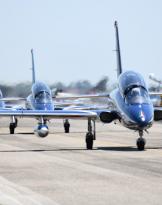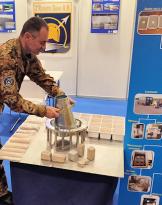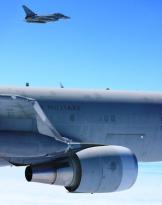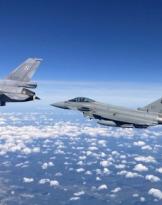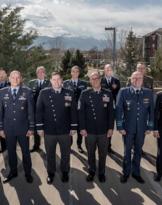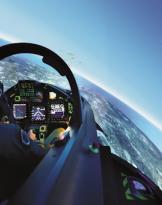On Monday 17 July, Pratica di Mare Airport hosted a delegation of about one hundred and fifty cadets and instructors from the French Aeronautical and Space Academy of Salon-de-Provence for a tour that will take them to other European aeronautical realities.
The delegation, led by Lieutenant Colonel Vincent Gauthier, coordinator of the courses of the French Aeronautical and Space Academy and by Major Stephen Price, tutor of the cadets of the 2nd course, was welcomed by the general of the air division Alessandro De Lorenzo, commander of the air division of aeronautical and space experimentation (DASAS) who first thanked the guests for having chosen the Pratica di Mare Airport and DASAS as a destination for their visit to Italy and then described the particular skills that the division expresses on a daily basis.
Subsequently, Col. Giuseppe Gentile, of thegeneral office space of the Defense General Staff, SMD representative, illustrated the perspective of the Italian Defense in the doctrinal and capacitive development of the space domain, with a particular focus on ongoing and future collaborations with the French partner, and those of the deputy commanders of the 14th wing and the multi crew training center (CAE MC) who described the activities of their respective departments.
Multiple questions were asked by the cadets demonstrating the interest aroused by the topics covered, especially on the technological development achieved by AM in the aerospace field.
The visit continued at aeronautical and space technologies and materials department (RTMAS) of DASAS, the first stage of the cognitive path, where the department head, col. Fabrizio De Paolis, illustrated the specific activities of the department. The guests were then taken to the chemical-physical laboratories where they were able to watch the analyzes and tests carried out by technicians and specialists on fuels and aeronautical components.
Particular interest aroused in the cadets the Biofuel, an aerospace propellant containing a percentage between 20% and 25% of biofuel of certified origin and the process of Non Destructive Testing (CND), i.e. a set of analytical techniques based on physical principles capable of providing information on the structural integrity and state of components of aerospace interest, without altering their physical state and therefore capable of increasing Flight Safety. In general, the level of competence and instrumental equipment of the department was appreciated, capable of providing data and evaluations on the performance, effectiveness and safety of materials and structures of the weapon systems.
The second stage of the visit took place at the hangars of the 14th wing, where pilots and on-board operators described the technical and operational capabilities of the aircraft present, while the specialists of the aircraft efficiency group (GEA) illustrated the maintenance activities that are carried out on the aircraft owned by the Department. The delegation then had the opportunity to closely observe the Gulfstream G-550 aircraft in its version Conformal Airborne Early Warning (CAEW), multi-sensor equipped weapon system with aerial surveillance, command, control and communications functions. The aircraft is regularly used both domestically and in support of NATO, helping to effectively guarantee the security of the skies.
The cadets also boarded a Boeing KC-767A set up in the COMBI version, where the pilots and operators of the In-Flight Refueling systems (OSRV) illustrated the technical peculiarities of the aircraft, in particular the Air to Air Refueling (AAR) and the multirole one. The KC-767A, in fact, thanks to the flexibility of varying configuration (COMBI, CARGO and FULL PAX), allows the performance of passenger and material transport missions, as well as those of strategic medical evacuation, as well as medical transport missions in Bio-Containment of highly infectious patients. The KC-767A aircraft of the Italian Air Force constitute a valid NATO asset and are fundamental in the security framework of the European Defense. They are, in fact, included in the European Air Transport Command (EATC) system, together with other assets belonging to the Air Forces of France, Germany, Spain and the Netherlands.
Subsequently, it was the task of a team of flight instructors, flight attendants and pilots from CAE Multi Crew, one of the International Flight Schools of the Italian Air Force, to welcome the delegation and show the systems with which the department trains Italian and foreign military pilots for transport aircraft. In particular, the ALSIM ALX static flight simulator of the FNTP II type, with which they are taught the basics of working in a multi-crew environment, in all forms of flight; the PIAGGIO P180 AVANTI I aircraft, with which personnel are trained in Italy and abroad in combat – service – support missions. The cadets and accompanying officers of the French Aeronautical and Space Academy have shown themselves particularly interested in the type of flight training provided by the School with the Italian aircraft, in accordance with the high European training standards sanctioned by the program European Undergraduate Military Transport Pilot Training (EUMTPT) recently concluded and with which the center assumed the title of European Defense Airlift School (EDAS Italy).
Overall, the visit of the French Aeronautical and Space Academy to the Pratica di Mare Airport represented an active and synergistic meeting point from an experiential and multidisciplinary point of view both for the French cadets and for the Seafaring and Specialist personnel of the departments involved. More generally, this event helped to strengthen the partnership between the Italian and French Air Forces.
La air division of aeronautical and space experimentation it represents the first and only example in Italy of rationalization and centralization in a single structure of the individual study and experimentation centers dependent on an Armed Force. An Organization which, in synergy with national and international aeronautical excellence, carries out activities of study, experimentation, testing, technical-operational evaluation and research support, of new aeronautical weapon systems, also for the benefit of other armed forces and/or armed bodies of the State, when required.
DASAS also ensures technical-logistical, administrative and operational support to the entities/departments of the AM located on the airport grounds, as well as to the entities of other armed forces and armed bodies of the State present. Finally, it ensures the services necessary for the safe and effective performance of flight activities and the management of activities related to the reception, embarkation and disembarkation of men, materials and vehicles arriving and departing from the Pratica di Mare airport.
In particular, the activities carried out by aeronautical and space materials technology department they concern all materials for aeronautical and space use, including armament ones, placing themselves in the field of materials science, analytical chemistry, applied chemistry and commodity science. In these fields, the Department expresses the ability to analyse, control, investigate and experiment and also has the task of carrying out technical-operational evaluations, experiments and investigations of the effectiveness of weapon systems and armament materials of aeronautical interest, carrying out personnel training and qualification activities in all these areas.




